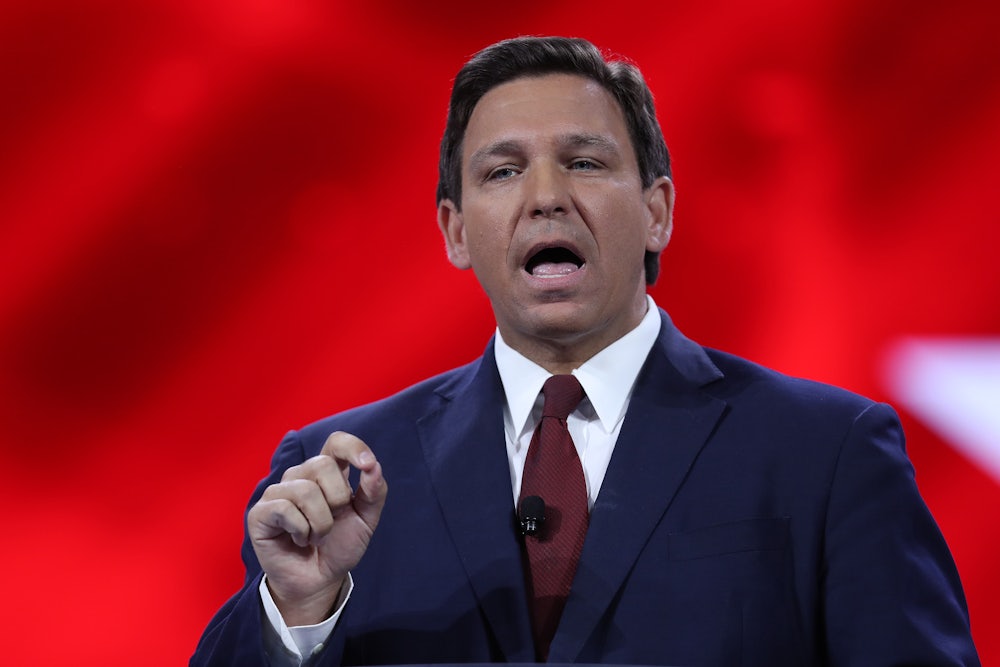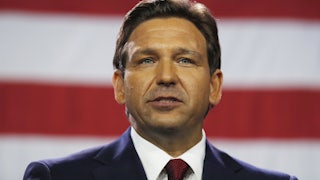What’s past is prologue. From 1956 to 1965, the state of Florida underwent a government-led campaign to root out LGBTQ people, civil rights activists, and supposed Communists from state institutions. Halfway through this McCarthyite witch hunt, which purged hundreds of students and teachers from the state’s universities, the chairman of a recently founded college in Sarasota spoke to Time magazine about his school, then aptly named “New College.” The chairman—coincidentally a third cousin of Alger Hiss, the government official whose 1948 espionage case helped lay the groundwork for the Second Red Scare—declared that the college would operate with “complete freedom of inquiry” and “no canned patriotism.”
Over the next half-century, New College developed a reputation for providing a top-notch liberal arts education, inspired by the tutorial model of its Oxford eponym. It was the first college or university in Florida to establish an open admissions policy, pledging not to discriminate based on “race, creed, national origin, or cultural status,” and was one of the first in the country to establish a program in environmental studies, an especially prescient move for a school located in one of the country’s most climate-vulnerable cities. It also became known as a haven for queer and transgender students: In 2021, a Harvard sociologist who previously taught at New College published a study on the school’s trans population and found that they “provide overwhelmingly positive assessments of their campus culture as related to issues of gender identity, a stark contrast to existing literature on gender-nonconforming collegians.” One former student estimated that 10 percent of the school is trans.
New College is undoubtedly a liberal enclave: Florida Governor Ron DeSantis carried Sarasota County by over 20 points in November, and two months earlier a slate of MAGA candidates won a local school board election with support from the Proud Boys. It was perhaps inevitable, then, that the school would find itself in the crosshairs of DeSantis’s ongoing neo-McCarthyite crusade. On Friday morning, DeSantis announced six appointees to the New School board of trustees. Of the six, the three most eye-catching are Christopher Rufo, who’s risen to notoriety as one of the best-known voices inveighing against “critical race theory” and stoking back-in-vogue incendiary anti-LGBTQ rhetoric; Charles Kesler, a senior fellow at the Claremont Institute, a far-right think tank; and Matthew Spalding, a professor of government at Michigan’s Hillsdale College, a deeply conservative private Christian college that both Rufo and DeSantis’s chief of staff explicitly held up as a model for the Florida school.
The governor’s press release didn’t elaborate on the new board members’ agenda. But in a tweet, Rufo said the group will seek to a create a new core curriculum, “abolish ‘diversity, equity, and inclusion’ and replace it with ‘equality, merit, and colorblindness,’” hire faculty “with expertise in constitutionalism, free enterprise, civic virtue, family life, religious freedom, and American principles,” and restructure academic departments “to reflect the new pedagogical approach,” among other policy changes. New College regulations give its trustees expansive powers to regulate student life and establish or discontinue degree programs and course offerings, so all of these changes are possible under a new right-wing majority, though attempts to fire tenured professors without cause would likely run afoul of the university’s collective bargaining agreement.
“Under the leadership of Gov. DeSantis, our all-star board will demonstrate that the public universities, which have been corrupted by woke nihilism, can be recaptured, restructured, and reformed,” Rufo wrote on Friday. In an interview with The New York Times, he added that he hopes this takeover will spur conservative state legislators “to reconquer public institutions all over the United States.”
The Florida Constitution imposes a residency requirement on board members in its college system but not on those in its public university system, which includes New College. Though Rufo, Kesler, and Spalding are all based outside Florida, their appointment is hardly a surprise. Rufo, who lives about as far from Florida as is possible in the contiguous United States, consulted on Florida’s Stop W.O.K.E. Act, which DeSantis signed in April 2022 with Rufo by his side. The bill’s practical effect has been the censoring of certain forms of classroom instruction related to race and racism. Last week, ProPublica’s Dan Golden reported that Florida professors had canceled their courses or watered down content in response to the legislation. Multiple sociology courses on race were canceled at the University of Central Florida, the state’s largest university, leaving a gaping hole in the curriculum: “Of the 39 courses offered this past fall by a department that specializes in the study of human society,” Golden reports, “none focused primarily on race.” The higher education portions of the legislation were temporarily blocked by in November by a federal judge, who called the bill “positively dystopian.” DeSantis is appealing the decision.
There’s no better avatar than Rufo for DeSantis’s ambitions to make Florida “where woke goes to die.” In his demagogic campaign to “lay siege to the universities,” Rufo has relentlessly pursued a series of “educational gag orders” in a number of states that have sought to forbid professors from discussing certain topics related to race, gender, and sexuality. In October, he also appeared to celebrate a targeted campaign against one such professor: When a University of Chicago undergrad-cum-conservative-influencer unleashed a wave of rape and death threats on an adjunct professor who was set to teach a winter course on “The Problem of Whiteness,” Rufo praised the student’s “excellent work” after he took to Twitter to brag about getting the class canceled. (In reality, the class was postponed to allow for time to institute safety precautions.) That student is now the national chairman of “Students for Ye,” a far-right youth organization dedicated to a Kanye West presidency.
The presence of Claremont and Hillsdale figures in DeSantis’s appointments is equally unsurprising. Both institutions eagerly hitched their wagons to Trump—they’re home to some of the country’s most notorious coup plotters and insurrectionists—but have more recently ingratiated themselves with DeSantis. Claremont gave DeSantis its Statesmanship Award in 2021, and Hillsdale’s president introduced the Florida governor as “one of the most important people living” during a 2022 event in Naples. Hillsdale in particular has taken an active role in DeSantis’s efforts to transform the state’s education system.
Most relevant for the new board members’ call to transform the New College curriculum is Spalding’s and Kesler’s service on Donald Trump’s 1776 Commission (Spalding served as the project’s executive director). Trump tasked the group with producing a rejoinder to The New York Times’ 1619 Project during the final months of his term, and the commission released its slapdash attempt in January 2021. Calling for “restoring patriotic education,” “The 1776 Report” accused American universities of being “hotbeds of anti-Americanism, libel and censorship,” and, aping Trump, blamed “deliberately destructive scholarship” for “the violence in our cities, suppression of free speech in our universities, and defamation of our treasured national statues and symbols.”
Not a single U.S. historian served on the commission, and the report included no citations, bibliographies, or scholarly references. In a statement responding to the report that was signed by 47 other organizations, the American Historical Association wrote that its “authors call for a form of government indoctrination of American students, and in the process elevate ignorance about the past to a civic virtue.” Half a century after New College’s first chairman warned against “canned patriotism,” that is precisely what’s coming to Sarasota.
Derek Black thinks that if his 18-year-old self were around today, he may have found himself nodding along to a Chris Rufo diatribe. Raised in an overtly white supremacist milieu—Black’s father is a former KKK grand wizard who founded the neo-Nazi website Stormfront—Black arrived at New College in 2009 a committed white nationalist activist. Black’s conversion story, much of which took place during his four years in Sarasota, became the subject of a 2018 book by journalist Eli Saslow. “Through many talks with devoted and diverse people [at New College]—people who chose to invite me into their dorms and conversations rather than ostracize me—I began to realize the damage I had done,” Black recounted in a 2016 New York Times op-ed. At the same time, Black wrote that he wouldn’t have begun to engage in those college conversations “without first experiencing clear and passionate outrage to what I believed from those I interacted with.”
Now a Ph.D. candidate in medieval history at UChicago, Black greeted the recent news coming out of his alma mater with dismay. “In the ways that [Rufo] engages in the world, I think I almost see a lot of my activism, the way that we were always so dedicated and focused on trying to find the right wording or the right turn of phrase, and then just repeated it a million times, and it really didn’t matter exactly how accurate it was or not,” Black said. “I guess I’d like to hope that I wouldn’t be quite as cruel as him, even when I was a teenager, but definitely I can recognize a whole lot of echoes of it.”
The uniquely proactive nature of the New College’s student body, which Black credits for his moral education, is something current students fear could be lost at the hands of DeSantis and his appointed surrogates. “Something I’ve noticed DeSantis saying in the media is that we’re being ‘indoctrinated’. I find that really interesting because almost all of the programs that we actually have on campus are student-initiated,” said London Weier, a fourth-year environmental studies and international area studies major. Weier said she responded to the news on Friday with a “combination of feeling extreme sadness, as if I had just lost something that had brought me so much joy and community over the past three and a half years, and then eventually shifting into this feeling of deep fear.”
New College academic life is student-driven too: Undergrads design their own courses of study and are encouraged to create their own majors. “We have such an independent learning model that it’s comical to say that we’re being indoctrinated,” said Jack Sobel, a fourth-year political science major. Sobel said he sees Rufo’s stated agenda as a “textbook example of indoctrination.”
“They don’t really understand what actually goes on in the classroom,” added second-year Basil Pursley, referring to the DeSantis appointees. “No professor I’ve met has come into the classroom and been trying to sway someone one way or another or influence them. It’s really about giving the whole picture and allowing us to make our own decisions.”
Black finds the DeSantis appointees’ stated desire to remake New College into a “classical college” laughable. “New College could rebrand itself as a classics college tomorrow,” he said. “They have so many classics classes already. You can take Latin, you can study Aristotle and Socrates, you can spend so much of your time studying premodern Europe, learning about the Middle Ages. New College is one of the major places in the country where you can go study medieval Europe and the formation of Christianity.” Black adds that he’s “never been anywhere that was more focused on being academically rigorous.”
So what is driving these appointments? “You’re attacking such a small school with these kids who are really brilliant, and which has a high proportion of students who have faced backlash just to who they are,” Black said. “For almost everybody I’ve ever known who went to New College, it was [a place where] you can figure out who you are, you can share that with your peers, and you can find a group of people who are going to make you a space where you can explore that and feel comfortable with it. I have a lot of trouble seeing this announcement as anything other than feeling uncomfortable with students being able to just feel like they don’t have to uphold any sort of traditional identity.”
Over the weekend, a nascent group of New College students started putting together a plan to defend their institution from the new trustees’ agenda. Weier and Sobel are members. “It’s easy in politics to categorize instead of empathize. It’s easy for people to look at a broad group and go, ‘They’re antithetical to my values. We don’t like them,’” Sobel said. “New College is full of students who are real people who will have to reckon with the ramifications of this, many of them far more personal than just the curriculum being changed.”






